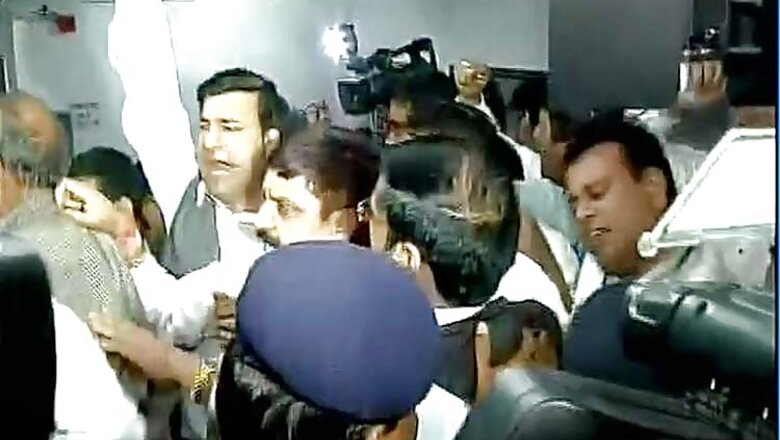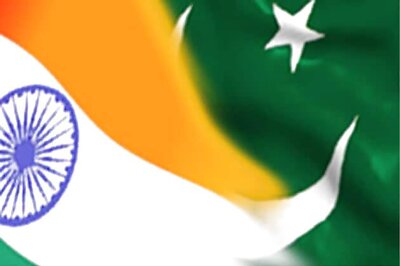
views
It happened in Arunachal Pradesh, it is happening in Uttarakhand and is likely to happen soon in Manipur. History, they say comes full circle!! The Congress party of today is facing exactly the same set of challenges it meted out to non Congress parties in the 1970s and 80s.
The all too familiar story of the ruling party at the Centre using its power and influence or stunning silence, to destabilize state governments led by parties in political opposition to it, is once again being played out. One had hoped that with the emergence of a competitive multi-party system, the adherence to the key principles of federal governance and respect for the autonomy of state politics would be preserved, protected and promoted.
Developmemts in the recent past do not seem to indicate any such trend. The election manifesto of the ruling party spoke of fostering a federal partnership with a strong Centre and strong states. It pledged its commitment to forging a meaningful cooperation between the Centre and the states. Having declared a sitting Chief Minister to be its Prime Ministerial candidate, the expectations were high that the legitimate role of the states would be recognised and their autonomy of politics respected.
The first sign of a return to the politics of the past rather than a departure from the politics of the past was evident when select Governors were advised to resign, cajoled to demit office, transfered to less politically significant states and in some cases dismissed. More often than not this happened in states where parties/alliances other than those in power at the Centre led the state governments. This was exactly the trend one witnessed during Congress led governments at the Centre.
Next, the choice of individuals to replace the Governors who resigned, were transferred or summarily sacked. They were, in most cases, political leaders who had been part of the ruling party at the Centre at some time in the immediate past or retired civil servants perceived as being supportive of the party in power at the Centre.
The Chief Ministers of the concerned states were not consulted when the choices were made but were merely informed of the same through formal procedures. This was exactly the same practise that was followed by previous Congress, Janata Party, United Front and National Front governments at the Centre.
When the Constitution was being drafted and the provisions relating to the Office of the Governor were being debated, many Constituent Assembly members had expressed serious apprehensions about the possibility of inappropriate people being appointed as Governors, states not being taken into confidence and Governors misuing the discretionary powers vested in them.
Nehru and Ambedkar has assured the Constituent Assembly that as far as possible politicians will not be appointed as Governors, Chief Ministers will be consulted while choosing Governors and the autonomy of the states would be respected and protected. This set of laudable conventions have been followed more in their breach. Central to the controversial developments in Arunachal Pradesh and now Uttarakhand is the role of the Governor.
It could be very persuasively argued that both in Arunachal Pradesh and in Uttarakhand, the political crisis is solely on account of the internal political convulsions in the Congress party. Undoubtedly, there is merit in this argument. Earlier too, when the Congress was in power at the centre the same situation played out in the states. Of course, those at the receiving end were non-Congress ruling parties in the states.
The Bommai government in Karanataka faced a crisis on account of a rebellion by ruling Janata party MLAs. A Governor (Venkatsubbiah) who had earlier been the Union Minister of State for Home in a Congress regime, refused to, allow a floor test and recommended to the Congress government at the Centre, the dismissal of the Bommai government and imposition of Presidents Rule. The Congress ruled centre happily and swiftly accepted the advice.
The current Foreign Minister and Finance Minister were the Leaders of the Opposition in the Lok Sabha and Rajya Sabha during UPA II. When a former Union Law Minister in a Congress Government (HR Bharadwaj) became Governor of a BJP ruled Karnataka and gave endless pinpricks to the Yeddyurappa led government, many a times, statements were made in the two Houses of Parliament by the Opposition leaders rightly condemning the attitude and actions of the Karnataka Governor.
One had hoped that being at the receiving end of federal injustice in the past, the ruling party at the Centre would have counseled its state units not to fish in the troubled political waters caused by the rumblings within the ruling party in the state.
One has noticed in the past, as in the case of the current political developments, that the government at the Centre does not enjoy the stature of a neutral umpire. Either the government itself or the leadership of the ruling party is often seen as a partisan player. As was seen in the Arunachal episode, the Supreme Court was petitioned at every small twist and sudden political turn. This does no credit to the norms of fair play that one expects in a federal system.
What is deeply disappointing in the present political narrative, is that most political parties appear to have become victims of selective political amnesia as they take positions at a given point of time totally unmindful of their stand in a similar situation in the past when they were possibly playing the role of a different character in the theatre of politics!
One wonders whether the lines of justification, argument and counter argument will ever go beyond a blame game as one wrong does not right another wrong. At the end of the day, history remembers political leadership not for maintaining the status quo but for putting in place precedents and conventions that would establish the credibility of institutions and processes. One is looking for that political dawn when the long term entrenchment and practice of laudable democratic traditions and conventions takes precedence over scoring short term political points.
(The author is a political analyst who is currently the Pro Vice Chancellor of Jain University. The views expressed in this article are his personal, views and do not reflect the position of the different institutions he is associated with or those of CNN IBN)



















Comments
0 comment